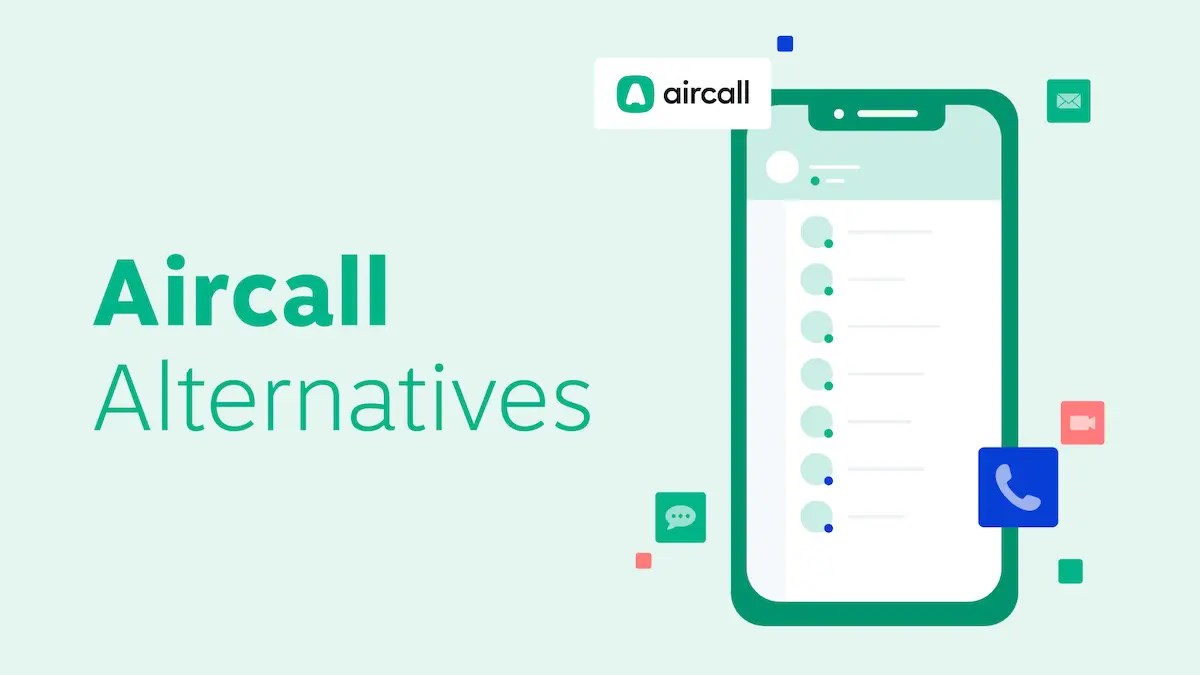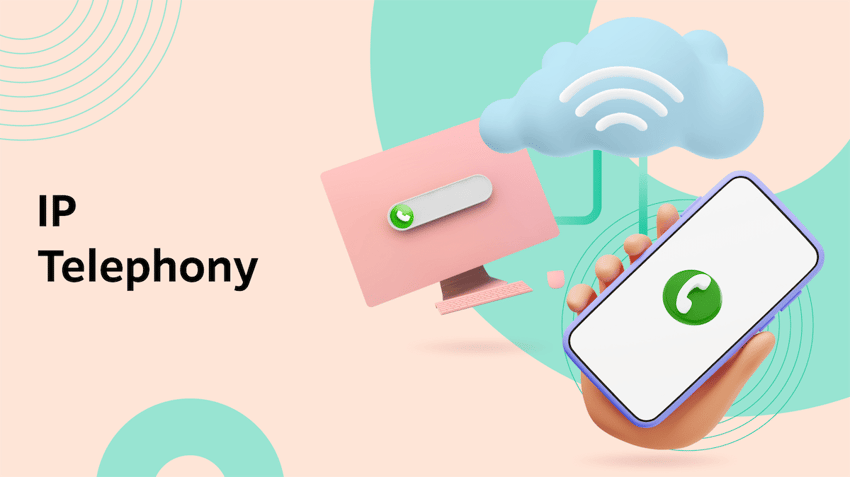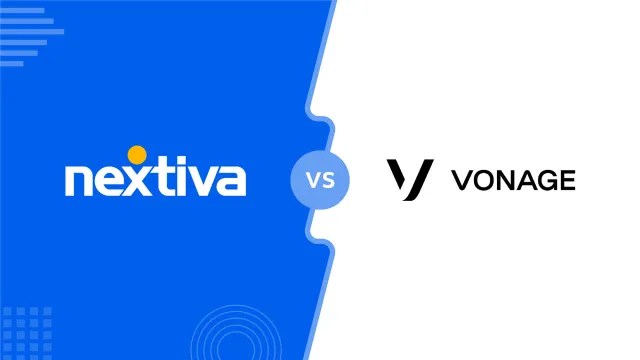Is Aircall leaving gaps in your communication strategy? Perhaps you’re hitting a wall with limited integrations, missing granular features, or just facing one too many dropped call tickets.
While Aircall is a popular choice for getting started, many growing businesses eventually hit a ceiling. Common frustrations include:
- Rigid pricing & contracts: From the 3-user minimum to add-on fees for basic analytics, costs can scale uncomfortably fast.
- Reliability issues: Users report latency and dropped calls, particularly when scaling to larger teams or international markets.
- Missing core features: If you need native video conferencing or robust team messaging, you’ll likely need to pay for a separate tool, as Aircall is voice-focused.
- Support & billing headaches: Navigating cancellations or resolving complex technical tickets can be slower than expected for non-enterprise accounts.
This guide breaks down the 12 best Aircall alternatives for 2026. We compare key features, pricing, and best use cases so you can make a confident decision to upgrade your business efficiency.
Why Businesses Start with Aircall
Aircall is popular for a reason. It offers a low barrier to entry for startups and small support teams.
- User-friendly interface: It’s easy to learn with minimal training.
- Solid core features: Covers essentials like IVR, voicemail, and basic call routing.
- CRM integrations: Connects quickly with Salesforce and HubSpot.
Why Businesses Leave Aircall
However, as your business grows, Aircall hits a ceiling. Here are the top reasons companies switch:
- Integration constraints: While Aircall covers many CRMs well, it lacks the deep, customizable integration capabilities needed for complex workflows. Users find the API actions limited compared to more flexible competitors.
- Pricing that doesn’t scale: Aircall’s pricing can become steep for growing teams. A 50-person team on the Professional plan ($50/user/mo) pays significantly more than they would with competitors offering similar feature sets for $25–$30/user.
- The add-on complexity: Many features that are standard on other platforms — like advanced analytics or AI transcription — are gated behind higher tiers or require third-party add-ons with Aircall.
Two Common Dealbreakers: Fax & HIPAA
- No native faxing: Aircall doesn’t have a native e-fax solution. If your business sends documents (healthcare, legal, real estate), you’ll need a third-party tool. Nextiva includes vFAX (virtual faxing) natively.
- HIPAA costs more: Aircall is HIPAA compliant, but typically only on their higher-tier or Enterprise plans. Providers like Nextiva offer HIPAA compliance across all plans with a signed Business Associate Agreement (BAA).
Top 12 Aircall Alternatives (2026 Comparison)
The following table compares the top contenders.
| Provider | Starting price | Best for | Key strength |
| Nextiva | $15/mo | Growing businesses | Unified CX & reliability |
| Grasshopper | $14/mo | Solopreneurs | Simplicity |
| OpenPhone | $15/mo | Startups | Mobile-first design |
| Dialpad | $15/mo | Sales teams | AI coaching |
| RingCentral | $20/mo | Enterprises | Robust feature set |
| Zoom Phone | $15/mo | Zoom users | Video integration |
| Phone.com | $15/mo | Budget users | Low volume usage |
| GoTo Connect | $26/mo | SMBs | Ease of use |
| 8×8 | $24/mo | Global teams | International calling |
| OnSIP | $18.95/mo | Flexible teams | Pay-as-you-go options |
| Ooma | $19.95/mo | Small offices | Physical hardware support |
| Twilio Flex | Usage-based | Developers | Customizability |
1. Nextiva
Best for: Growing businesses, remote teams, and those who prioritize a balance of features, reliability, and support.

Nextiva is a unified communications powerhouse known for its reliability, excellent call quality, and vast feature set (over 40 standard and advanced options). It’s highly rated for ease of use and customer support.
Top features: Advanced call analytics, screen pops with customer details, the NextivaONE app for unified communication, customizable auto attendants, and built-in CRM integrations.
Pricing:
Nextiva offers feature-packed plans that match small business budgets. The tiers (when billed annually) include:
- Core ($15/user/month): Unlimited voice and video calling, business SMS, and Outlook/Google integrations.
- Engage ($25/user/month): Adds live & bot web chat, inbound call center software, toll-free numbers, and video meeting recording.
- Power Suite CX ($75/user/month): A full omnichannel suite with AI-powered transcription & summarization, intelligent routing, and complete conversation history (voice, SMS, and chat in one view).
Why switch: Why switch: You get a full Unified Communications (UCaaS) suite —including native video and chat — for half the price of Aircall’s entry-level plan.

2. Grasshopper
Best for: Solopreneurs, budget-conscious small businesses.
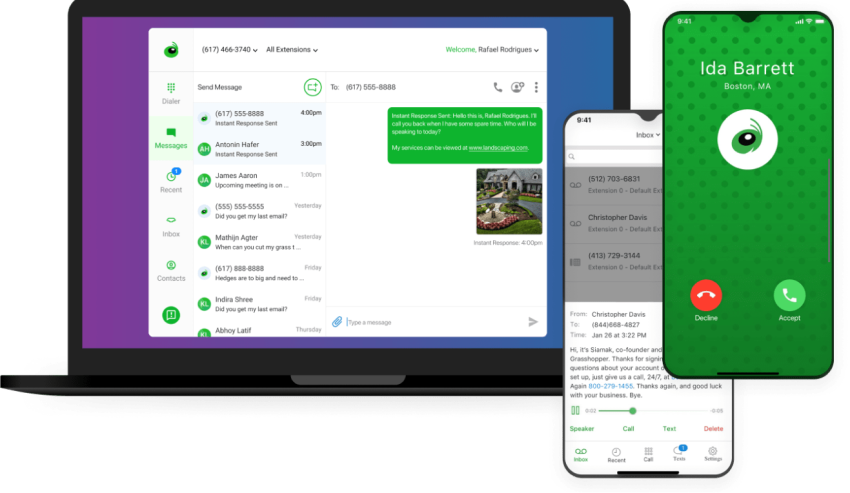
Grasshopper is a legacy favorite for solopreneurs who want to add a business line to their personal phone without buying new hardware.
Top features: Vanity numbers, custom greetings, and a virtual receptionist.
Pricing: Grasshopper caters to small businesses with four feature-packed plans at affordable price points. The tiers differ based on the number of users, business numbers, and extensions supported:
- True Solo ($14/mo): 1 user, 1 phone number.
- Solo Plus ($25/mo): Unlimited users, 1 phone number, 3 extensions.
- Small Business ($55/mo): Unlimited users, 4 phone numbers, unlimited extensions.
Why switch: Perfect for solopreneurs who just need a virtual phone number, not a full-fledged business phone system like Aircall.
3. OpenPhone
Best for: Startups, small teams, and businesses needing a flexible, mobile-centric solution.
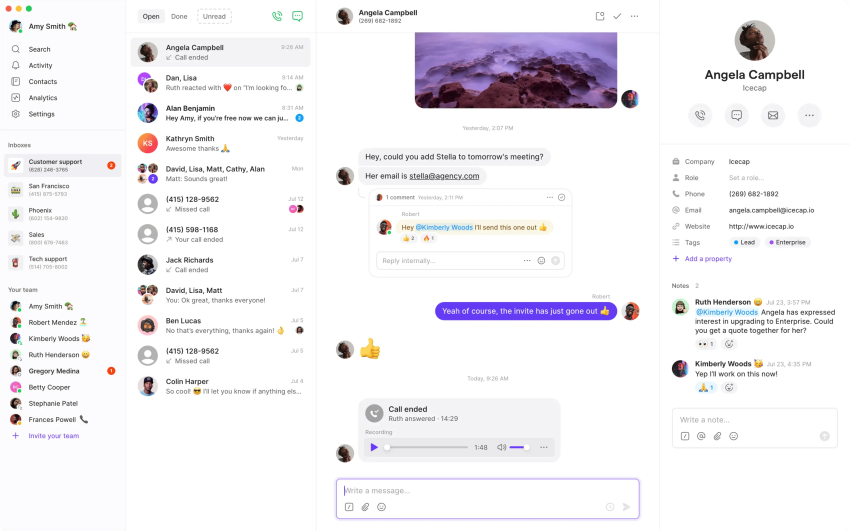
OpenPhone is a modern, mobile-first app designed for startups. It treats phone calls more like a messaging app, with a clean and intuitive interface.
Top features: Shared inboxes, auto-replies, and lightweight CRM features.
Pricing: OpenPhone offers three main pricing plans, each with optional features and add-ons:
- Starter ($15/user/mo): Basic calling and SMS.
- Business ($23/user/mo): Adds call transfers, group calling, and HubSpot/Salesforce integrations.
- Enterprise: Custom contract and pricing, a dedicated account manager, priority support, and an audit log.
Why switch: Excellent for modern startups that want an intuitive user interface, but may lack the heavy-duty routing features of enterprise tools.
4. Dialpad
Best for: Sales-driven organizations, remote teams, and businesses that want AI to improve call performance.

Dialpad is a strong contender for sales teams, focused on Voice Intelligence (Vi) to transcribe calls and analyze sentiment in real-time.
Top features: Real-time transcription, live sentiment analysis, and Google Workspace integrations.
Pricing: Dialpad provides three main pricing tiers (billed annually):
- Standard ($15/user/mo): Unlimited calling and AI transcription.
- Pro ($25/user/mo): Adds CRM integrations (Salesforce) and 24/7 support.
- Enterprise Plan (Contact Sales)
Why switch: A top choice if your primary goal is coaching sales reps using AI data.
5. RingCentral
Best for: Large businesses needing advanced call management capabilities.

RingCentral is a UCaaS platform that combines team messaging, video conferencing, and a business phone system. It works for businesses of all sizes.
Top features: Multi-level IVR, video conferencing for large groups, and comprehensive analytics.
Pricing:
- Core ($20/user/mo): Unlimited domestic calling and IVR.
- Advanced ($25/user/mo): Adds automatic call recording and CRM integrations.
Why switch: Large enterprises find RingCentral useful for its extensive feature set, though the interface can feel complex compared to Aircall.
6. Zoom Phone
Best for: Businesses prioritizing video conferencing integration and smaller teams.
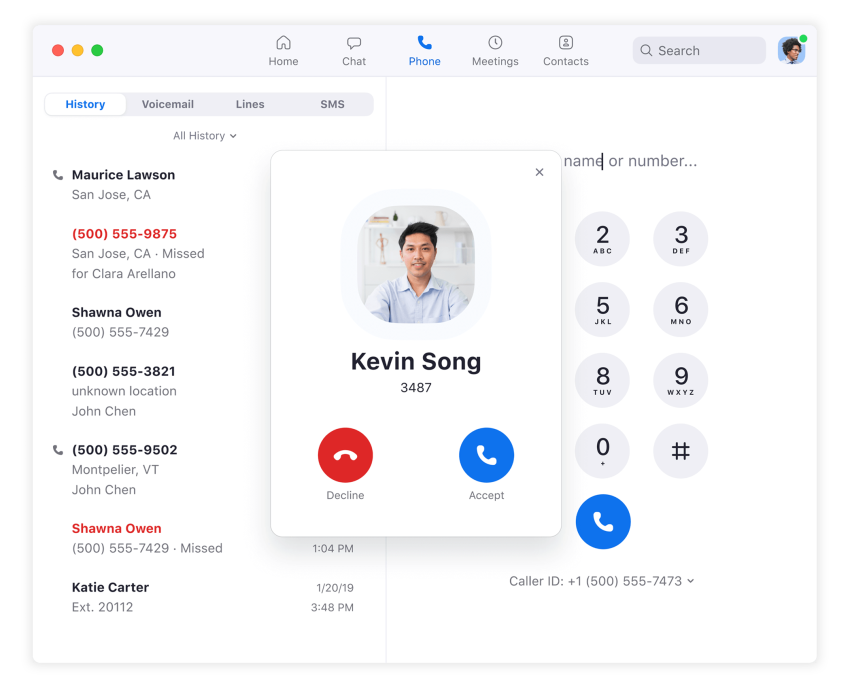
If you already live in Zoom meetings, adding Zoom Phone is a natural step. It brings PBX features directly into the Zoom app.
Top features: Seamless escalation from phone call to video meeting, intelligent call routing.
Pricing:
- Metered ($10/user/mo): Pay-per-minute for outbound calls.
- Unlimited ($15/user/mo): Unlimited domestic calling.
Why switch: The most convenient add-on for existing Zoom-heavy users.
7. Phone.com
Best for: Price-sensitive businesses, startups, and small teams with basic communication needs.
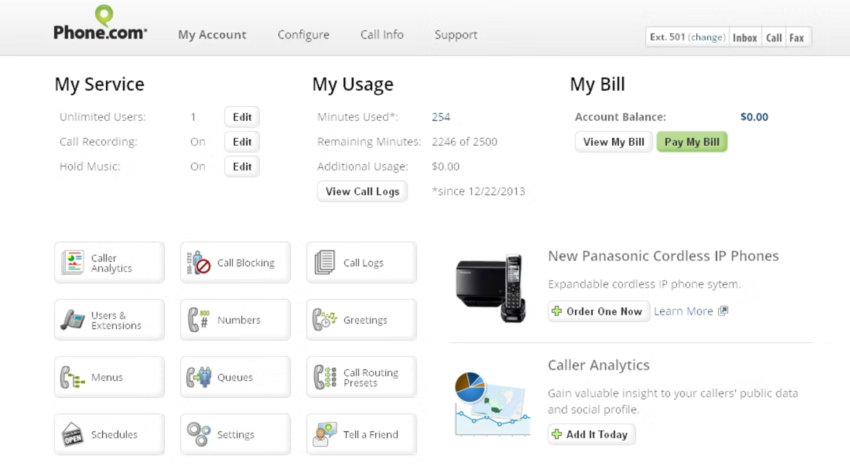
Phone.com focuses on affordability and flexibility, making it a solid choice for businesses with very low call volumes.
Top features: Mix-and-match user plans, HIPAA compliance options.
Pricing: Phone.com offers three pricing tiers:
- Basic (15/user/mo): Unlimited minutes.
- Plus ($22.50/user/mo): IP desk phone compatibility and AI-powered routing.
- Pro ($33.33/user/month): Call recording, call analytics, voicemail transcription, and CRM integrations.
Why switch: Good for businesses that need a professional presence with the added cost of a full-blown business phone system.
7. GoToConnect
Best for: Small to medium-sized businesses prioritizing team collaboration.

Formerly Jive, GoTo Connect combines hosted PBX with GoToMeeting’s video conferencing capabilities.
Top features: Call center software, hot desking, personal meeting rooms, and integration with other GoTo products.
Pricing:
No pricing is listed on the website. Here’s an estimate. Users can contact GoTo Connect for a quote.
- Phone System ($26/user/mo): Standard cloud PBX features.
- Connect CX ($34/user/mo): Adds customer experience tools.
Why switch: A reliable, easy-to-use option for SMBs who want bundled video and voice.
9. 8X8
Best for: Larger businesses, international companies, and those needing advanced contact center software.

8×8 specializes in global communications, offering unlimited calling to roughly 48 countries on its mid-tier plans.
Top features: Global reach, omnichannel contact center, and secure voice.
Pricing:
8×8 pricing requires custom quotes across its tiers:
Why switch: The winner for teams with a heavy international presence.
10. OnSIP
Best for: Businesses wanting to retain their current numbers, those needing customizable plans, and companies with varying call volumes.
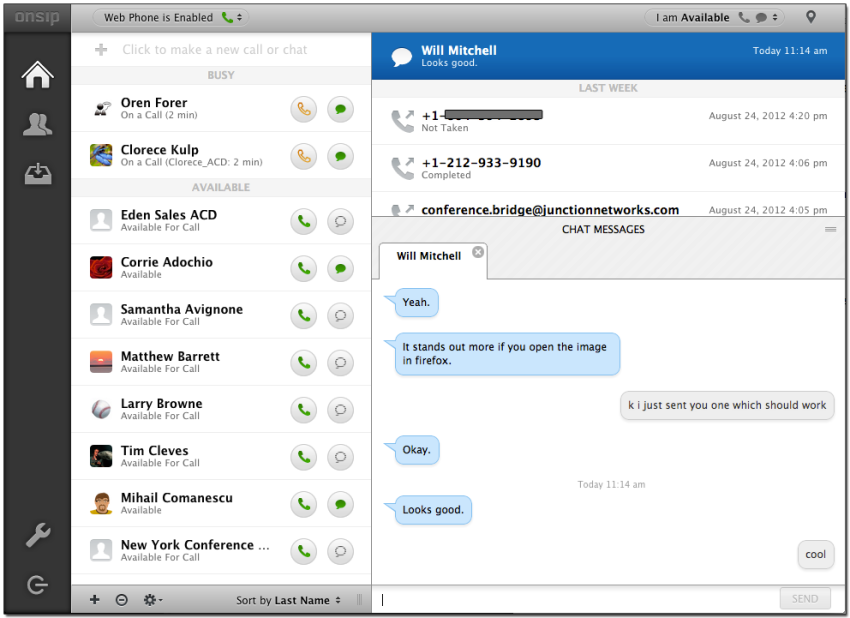
OnSIP is a hosted VoIP provider offering a unique pay-as-you-go model that can be very cheap for teams with low call volumes.
Top features: WebRTC-based webphone, distinct per-account pricing model.
Pricing: Onsip offers two main pricing plans:
- Unlimited ($18.95/user/mo): Standard per-user model.
- Basic ($49.95/account/mo): Includes all features for unlimited users, but you pay per minute for calls.
Why switch: Flexible for seasonal businesses or those with fluctuating call volumes.
11. Ooma Office
Best for: Small businesses, those prioritizing ease of use, and teams that need a simple, affordable phone system.
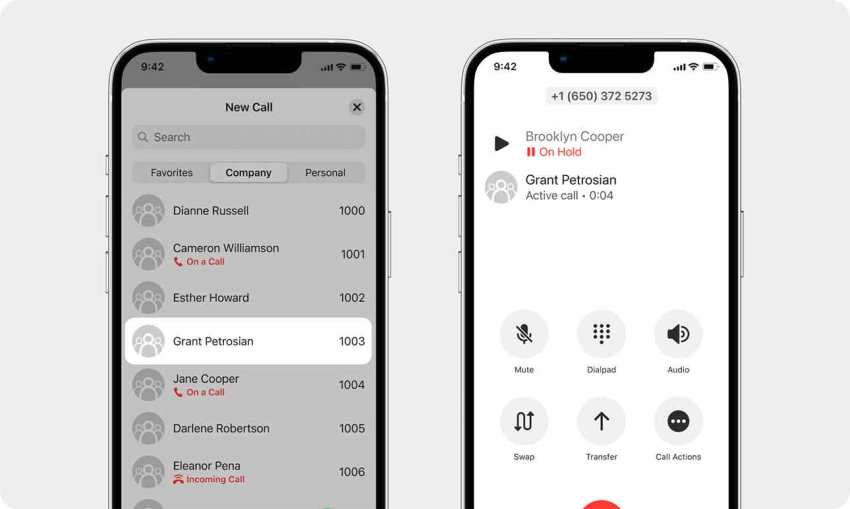
Ooma is known for its simple, plug-and-play hardware and ease of setup, catering to traditional small business offices (like retail or dental).
Top features: Virtual receptionist, mobile app, and physical hardware support.
Pricing: Ooma offers three straightforward pricing tiers:
- Essentials ($19.95/user/mo): Standard PBX features.
- Pro ($24.95/user/mo): Adds call recording and desktop app.
- Pro Plus ($29.95/user/mo): Includes all the features of Ooma Office Pro, plus 1,000 text messages per month and call recording.
Why switch: Perfect for brick-and-mortar small businesses that want a physical phone on the desk.
12. Twilio Flex
Best for: Businesses with specific workflow needs, developers, and companies looking for a highly adaptable contact center solution.
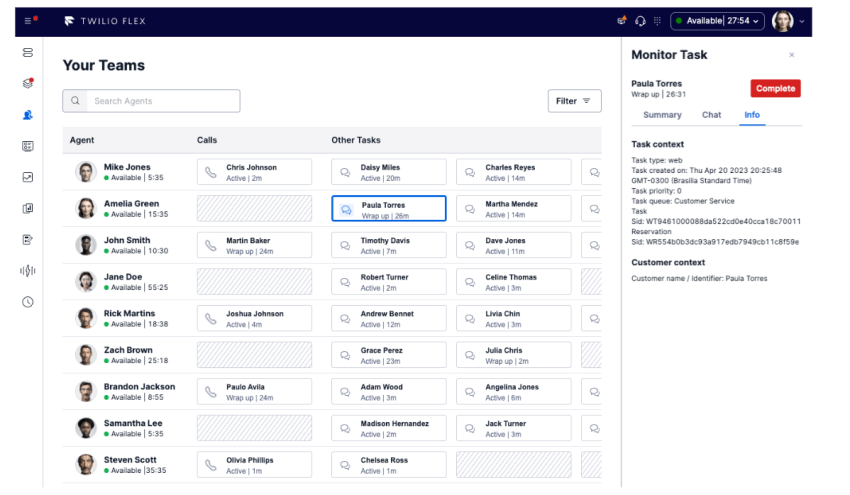
Twilio Flex isn’t a ready-made phone system; it’s a programmable contact center platform for developers who want to build something custom.
Top features: Completely customizable UI, intelligent routing API, and endless integration potential.
Pricing: Twilio Flex pricing varies by user, with 5000 free user hours and two pricing tiers:
- Per-hour: ~$1 per active user hour.
- Per-month: ~$150 per named user per month.
Why switch: Best for tech-heavy companies with a development team that wants to build a bespoke solution.
How To Choose the Right Aircall Alternative
Selecting the right Aircall alternative requires considering more than just your business needs. Here’s a breakdown of key factors to assess:
- Business size and call volume: Your team size and the number of phone calls you handle daily will influence your feature requirements and scalability needs.
- Essential features: Identify the must-have features for your call center operations, such as advanced analytics, specific CRM integrations, or AI-powered call coaching.
- Budget: Compare pricing structures and choose a solution that aligns with your budget while providing the necessary features.
- Ease of use: Consider the user interface and onboarding process, ensuring a smooth transition for your team.
- Customer support: Assess the importance of readily available, responsive, and reliable customer support.
- Integration capabilities: Ensure the chosen alternative integrates seamlessly with your existing tech stack (CRM, helpdesk, etc.).
- Scalability: Prioritize solutions that can scale with your business as you grow.
- Security and Compliance: If you handle sensitive call data, prioritize providers with strong security measures and compliance certifications (e.g., HIPAA, GDPR).
- Call quality: Look for cloud phone systems with a reputation for reliable call quality and minimal downtime.
Don’t rush your decision. Request free trials or demos to get a hands-on feel for the platforms. Remember to compare features side by side and involve your team in the evaluation process.
Why Is Nextiva the Best Aircall Alternative?
The right communication solution balances features, cost, ease of use, and scalability. Nextiva hits that sweet spot.
- Better value: With plans starting at $15/mo (vs Aircall’s typical $30/mo start), Nextiva offers more features for less money.
- Scalability: You can start with the Core plan for basic needs and upgrade to Power Suite CX for a full omnichannel contact center, AI transcription and summarization, and ACD callback without migrating data or changing vendors.
- Reliability: Nextiva’s network is backed by military-grade security and 99.999% uptime, ensuring you don’t suffer from the dropped calls that plague some competitors.
See why customers choose Nextiva:

See the difference for yourself. Don’t just take our word for it.
Ready to take your phone system to the next level?
See how Nextiva can replace Aircall, Zoom, and your chat tool in one go.
Note: Aircall, Grasshopper, OpenPhone, Dialpad, Phone.com, GoToConnect, 8×8, OnSIP, Ooma Office, and Zoom are not affiliated with Nextiva, Inc. and are the registered trademarks of their respective owners.
Frequently Asked Questions
Nextiva and RingCentral are the two largest Aircall competitors.
Nextiva is the top choice for businesses prioritizing reliability, ease of use, and a lower price point ($15/mo vs. Aircall’s $30/mo).
RingCentral is the go-to for large enterprises needing global reach and complex features.
No, Aircall doesn’t offer a free plan. Their pricing starts at $30 per user/month (billed annually) with a 3-user minimum, meaning the lowest entry cost is roughly $90/month. If you need a free or ultra-low-cost alternative, consider Bitrix24 (which has a free tier) or OpenPhone, which starts at just $15/user/month.
Yes, Aircall can be HIPAA compliant, but this is usually reserved for their higher-tier or Enterprise plans where they can sign a Business Associate Agreement (BAA). Better alternative: Nextiva is HIPAA compliant across all plans, making it a much more affordable choice for healthcare startups and medical offices.
Nextiva offers several advantages over Aircall, including:
– More comprehensive features: Nextiva provides a wider range of features, including advanced call analytics, screen pops with customer details, a unified communications app, and more.
– Stronger customer support: Nextiva is known for its excellent customer support, with readily available and helpful representatives.
– Better value for money: Nextiva’s pricing is competitive, and its features provide more value, especially for growing teams.
– Unified platform: Nextiva goes beyond basic calling features by integrating phone, video, and messaging into a single platform.
You can cancel via the dashboard if you are an admin, but you must pay any accrued fees before leaving. Aircall does not charge a port-out fee to move your numbers to a new carrier, but your new provider might charge a small fee to bring them in.
Pro Tip: Do not cancel your Aircall account until after your numbers have successfully ported to your new provider, or you risk losing your business numbers forever.
Switching from Aircall to Nextiva is easy:
– Sign up for a Nextiva account: Choose the plan that best suits your needs.
– Port your numbers: Work with Nextiva to port your existing business phone numbers.
– Set up your system: Configure your Nextiva account with your preferred settings, call flows, and integrations.
– Train your team: Familiarize your team with the Nextiva platform and its features.
– Go live! Once everything is set up, you can start using Nextiva for your business communications.

















 VoIP
VoIP 

